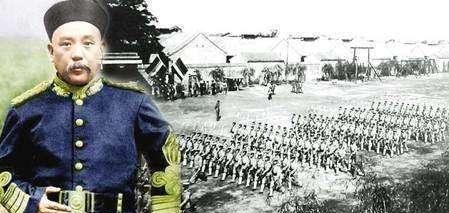The six towns of Beiyang were the elite of the late Qing army. Towns, not small towns, nor townships, but the establishment of the army. When many people talk about Yuan Shikai, they think of the six towns of Beiyang. The reason why Yuan Shikai could not defeat him was because he had the strength of the six towns in Beiyang.
So, who is the ruler of the six towns in Beiyang? What happened to them later? First of all, the first town, the original rule was a Manchu, called Fengshan. In fact, yuan shikai's most uncontrollable thing was the first town in Beiyang, and the Qing court left a hand on him, so he handed over the first town to the Manchus themselves.

There were not many manchus who knew the soldiers, and Fengshan was quite OK, but unfortunately, he later became a general in Guangzhou and was killed by the revolutionary party. After his death, Fengshan was given the title of Crown Prince Shaobao, on par with Yuan Shikai. Fengshan is also a bibliophile, and his family has a lot of fine works, which are very precious.
After Fengshan, the control of the first town in Beiyang was replaced by Yuan Shikai's concubine He Zonglian. After Yuan Shikai became president, He Zonglian was promoted to military attaché. After Yuan Shikai's death, He Zonglian rolled up the soft and fifty thousand oceans and returned to his hometown in Shandong, no longer asking about political affairs. This man is very knowledgeable about current affairs.
The second town of Beiyang was successively controlled by Wang Yingkai and Zhang Huaizhi. These two can be regarded as Yuan Shikai's confidants. Among them, Wang Yingkai was Sun Chuanfang's brother-in-law, who unfortunately died early in 1908. Zhang Huaizhi died of illness in 1934.
The third town of Beiyang is definitely the main force and concubine of Yuan Shikai, and the system is successively Duan Qirui, Duan Zhigui and Cao Kun. Of course, these three are all Yuan Shikai's sworn enemies. Among them, Duan Qirui was the first fierce man under Yuan Shikai, and later the leader of the Anhui warlords, and served as the premier of the Republic of China for four times.
Duan Zhigui, on the other hand, was known as Yuan Shikai's son, who was incompetent, but was good at greeting people, and later served as the governor of Huguang and the chief of the army. Cao Kun was Yuan Shikai's Huwei general, and later he actually spent money and bought a big president as a pawn.
Wu Fengling, the ruler of the fourth town of Beiyang, grew up in Yuan Shikai's family, and later followed Yuan Shikai and served as Yuan Shikai's bodyguard. This person is also definitely Yuan Shikai's concubine. Unfortunately, Wu Fengling died before Yuan Shikai in 1912.
Wu Changchun, the ruler of the fifth town of Beiyang, was the cousin of Yuan Shikai's old boss Wu Changqing, a neglected anti-Japanese general. At that time of the Sino-Japanese War, Wu Changchun was stationed in Lushun, and after more than sixty days of bloody battles with the Japanese army, his mount was hit by bullets, but he had no fear.
Finally, there is the sixth town of Beiyang, which is dominated by Wang Shizhen, the head of the Three Masters of Beiyang, and later Zhao Guoxian. Wang Shizhen later also served as army chief and premier of the Republic of China. What about Zhao Guoxian? That is the people of Xiangcheng, Henan, Yuan Shikai's old family, absolutely their own people. Zhao Guoxian died at the hands of the Revolutionary Army in 1911.